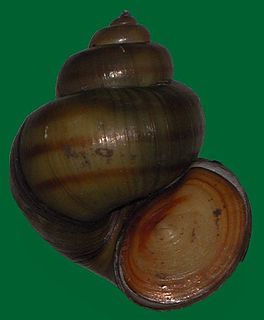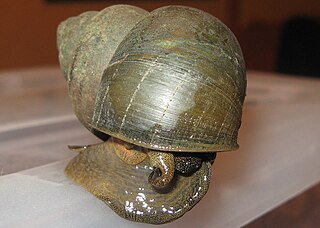| Viviparus teschi Temporal range: Pleistocene | |
|---|---|
 | |
| The shell of Viviparus teschi from a borehole in Arnhem, Netherlands | |
| Scientific classification | |
| Kingdom: | Animalia |
| Phylum: | Mollusca |
| Class: | Gastropoda |
| (unranked): | clade Caenogastropoda informal group Architaenioglossa |
| Superfamily: | Viviparoidea |
| Family: | Viviparidae |
| Subfamily: | Viviparinae |
| Genus: | Viviparus |
| Species: | † V. teschi |
| Binomial name | |
| Viviparus teschi Meijer, 1990 [1] | |
Viviparus teschi is an extinct species of freshwater snail with an operculum, an aquatic gastropod mollusk in the family Viviparidae, the river snails.
In biology, a species ( ) is the basic unit of classification and a taxonomic rank of an organism, as well as a unit of biodiversity. A species is often defined as the largest group of organisms in which any two individuals of the appropriate sexes or mating types can produce fertile offspring, typically by sexual reproduction. Other ways of defining species include their karyotype, DNA sequence, morphology, behaviour or ecological niche. In addition, paleontologists use the concept of the chronospecies since fossil reproduction cannot be examined. While these definitions may seem adequate, when looked at more closely they represent problematic species concepts. For example, the boundaries between closely related species become unclear with hybridisation, in a species complex of hundreds of similar microspecies, and in a ring species. Also, among organisms that reproduce only asexually, the concept of a reproductive species breaks down, and each clone is potentially a microspecies.

Freshwater snails are gastropod mollusks which live in freshwater. There are many different families. They are found throughout the world in various habitats, ranging from ephemeral pools to the largest lakes, and from small seeps and springs to major rivers. The great majority of freshwater gastropods have a shell, with very few exceptions. Some groups of snails that live in freshwater respire using gills, whereas other groups need to reach the surface to breathe air. In addition, some are amphibious and have both gills and a lung. Most feed on algae, but many are detritivors and some are filter feeders.

The operculum, meaning little lid, is a corneous or calcareous anatomical structure like a trapdoor which exists in many groups of sea snails and freshwater snails, and also in a few groups of land snails; the structure is found in some marine and freshwater gastropods, and in a minority of terrestrial gastropods, including the families Helicinidae, Cyclophoridae, Aciculidae, Maizaniidae, Pomatiidae, etc.
The specific name is in honor of Dutch geologist Pieter Tesch (1879-1961).










